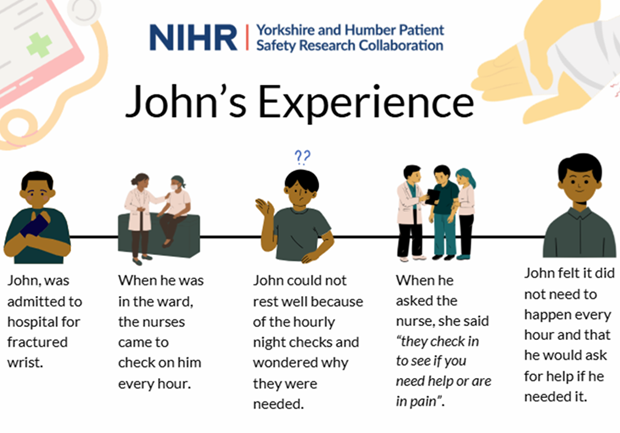Is it keeping you safe, or just routine?
The De-Cluttering (Safely) for Safety research team at the Bradford Institute of Health Research are working to reduce safety practices carried out in healthcare that don’t have any benefit for patients. These are things that are meant to make care safer, but in reality, don’t actually help.
We understand that many people feel safer when more checks and steps are carried out – people often think that more means better. However, that is not always true. Adding things like extra observations, forms and checklists, tests or alarms that haven’t been shown to have any benefits for patients can be a problem. These extra tasks take up time and put more pressure on staff who are already overstretched, without improving patients’ safety.
To plan our next research project, we are trying to identify health care tasks that people don’t think are helpful in making them safer when they are in hospital.
For example:
It is not always easy for patients to be able to know what parts of care are made to keep them safe. Many safety practices happen without people knowing – such as two members of staff checking medicines before they are given. From the view of patients, safety practices might look like conversations with a nurse in preparation for a procedure, being checked on every hour, or being restrained when unwell on a mental health ward to keep everyone safe.
To plan our research, we are looking for people to share things that they have experienced in health care that felt unnecessary, could have been done less often, or didn’t really make sense to them. Use this link:
About Care Opinion:
- Care Opinion is non-profit and independent of the NHS
- You can post any experience of care from the past three years
- Care Opinion will share your story online, without identifying you
- Your story will help our research, and may also help NHS staff to make improvements to care
We are also asking staff to share examples of low value safety practices (parts of care that you think add little value to the safety of patients) to help shape our research. If you have any comments or ideas, please post your responses here.
Is it keeping you safe, or just routine?
Is it keeping you safe, or just routine? https://www.careopinion.org.uk/resources/blog-resources/0-images/1646ec06e58d43a0be51d9069c05f9ac.png Care Opinion 0114 281 6256 https://www.careopinion.org.uk /content/uk/logos/co-header-logo-2020-default.pngQuestion from Yorkshire & Humber Patient Safety Research Collaboration
Posted by Jessica Rich, PhD student, Yorkshire & Humber Patient Safety Research Collaboration, on
Thanks for your feedback.

